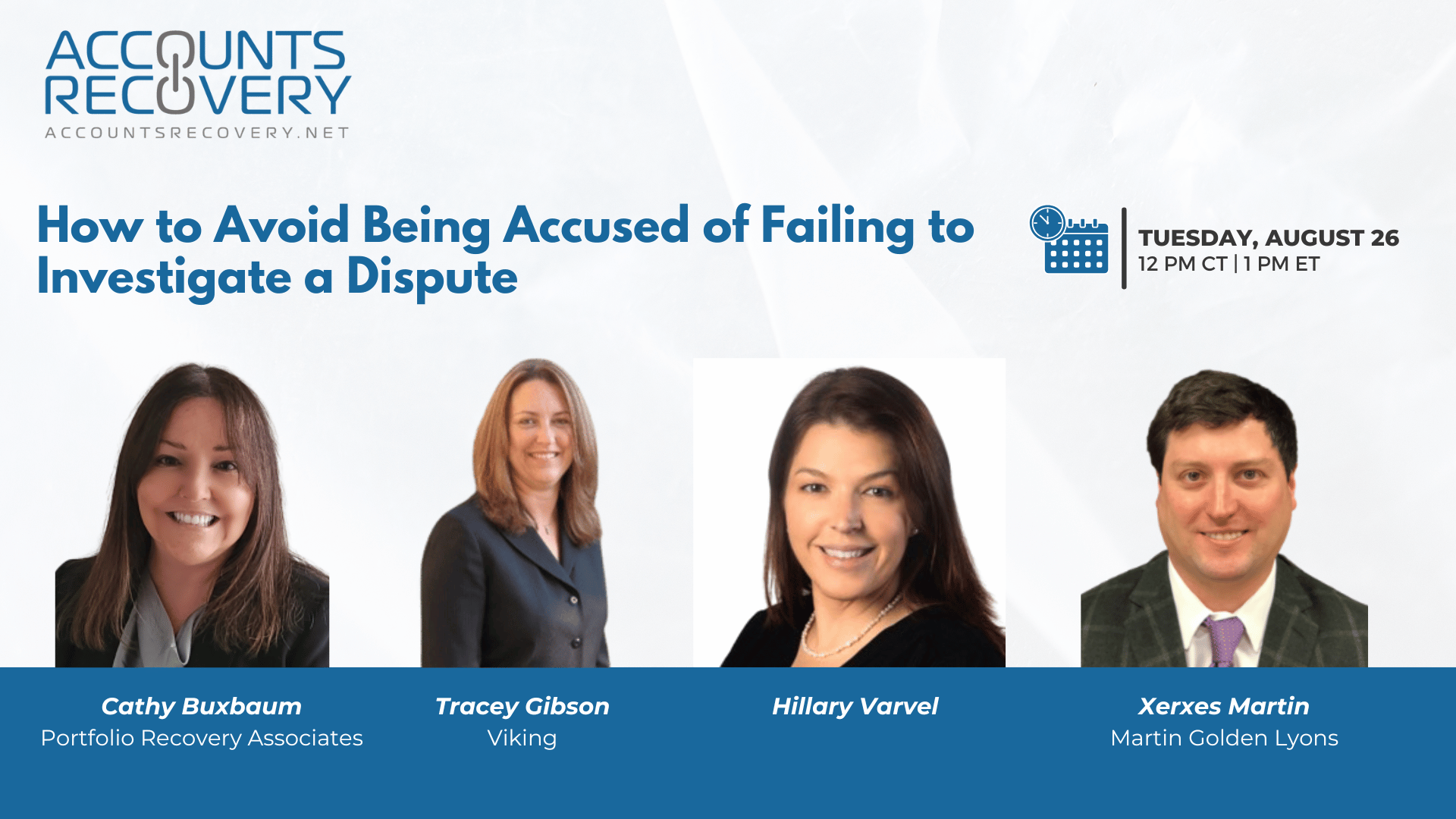- AccountsRecovery Daily Digest
- Posts
- Daily Digest - August 22, 2025
Daily Digest - August 22, 2025
Brought to you by: TCN | By Mike Gibb

🎉🎂 Happy Birthday to: Marny Abbott of AllianceOne, Shauna Ambrose of Ally, Kylie Hart of Solutions by Text, and Candice E. O’Brien of ACA.
🚨New Training Bytes Video Released!
Check out the newest Training Bytes video! Each week, an expert from the accounts receivable management industry will share how he or she would handle different scenarios that collectors often face. This week, Ryan Thorpe from FFAM breaks down the differences between handling inbound and outbound calls. Thanks to Peak Revenue Learning for sponsoring this series! Click on the image below to view this week’s episode!
🔖 🎓 Now with CLE Credits!
CU Accused of FCRA Violation for Not Investigating BK Dispute
Bankruptcy. It’s not for the faint of heart. A credit union and credit reporting agencies are facing claims they violated the Fair Credit Reporting Act over the plaintiff’s bankruptcy filing and how it was reported on the plaintiff’s credit report and for not conducting a reasonable investigation after the plaintiff filed a dispute.
This series is sponsored by WebRecon

A MESSAGE FROM TCN
TODAY‘S WEBINAR
UPCOMING WEBINARS
Judge Labels Plaintiff ‘Vexatious,’ Grants MTD in FDCPA, FCRA Case
Having read more than a few rulings over the years, I feel somewhat qualified to opine that when a complaint lodges 17 different counts, chances are it’s not going to go well for the plaintiff. A District Court judge in Massachusetts has granted motions to dismiss filed by defendants in a Fair Debt Collection Practices Act and Fair Credit Reporting Act lawsuit brought by a “vexatious” plaintiff.
CFPB Targets Bankrupt Fintech in Enforcement Action Over Record-Keeping Failures
The Consumer Financial Protection Bureau yesterday announced it had filed an adversary proceeding against Synapse Financial Technologies, a bankrupt fintech company. The complaint alleges violations of the Consumer Financial Protection Act due to Synapse’s inadequate record-keeping of consumer funds.
CFPB Reopens Rulemaking on Personal Financial Data Rights
The Consumer Financial Protection Bureau today issued an Advance Notice of Proposed Rulemaking, to revisit its open banking rule, known as the Section 1033 rule, under the Dodd-Frank Act. The move follows a Kentucky district court’s stay of a lawsuit challenging the 2024 rule, which was criticized for exceeding statutory authority and risking consumer data security.
WORTH NOTING: A cool dozen money-saving hacks for raising kids, from parents who did it ... Consumers are generally feeling good about their finances and a little less good about the state of the economy ... Of all the players who have ever played a game in the NBA, LeBron James has played against more than one-third of them ... People are really upset over Cracker Barrel's new logo ... I loved the '90s as much as anyone, but I'm not sure I missed this enough to want to eat it ... If fear is keeping you from innovating, here is how to get over it ... Here is a list if you are looking for gender-neutral baby names ... Birds in urban areas are staying awake longer. Scientists have figured out why.
Funny Friday, part I
Funny Friday, Part II
Webinar Recap: How to Move Up Your Client's Scorecards

In a competitive collections market, where being at the top of a client’s scorecard can mean stronger placements and better retention, agencies must look beyond recovery rates to deliver measurable value. In this webinar, hosted by AccountsRecovery.net and sponsored by CSS Impact, industry leaders shared strategies for improving client rankings and strengthening long-term relationships.
🧠 Key Takeaways:
Understand What Clients Value Most.
Scorecards vary—some emphasize recovery rates, while others focus on speed-to-contact, communication frequency, or integrations with client systems. Agencies should clarify which metrics matter most to each client and tailor their processes accordingly.Use Scorecards Proactively.
Even if clients don’t provide formal scorecards, agencies should build their own. Tracking performance internally allows agencies to identify issues early, compare results against client expectations, and present proactive solutions. This positions agencies as partners rather than vendors.Balance Metrics with Relationships.
While scorecards are important, relationships often outweigh the numbers. Open communication, transparency about expectations, and even helping clients reduce their workload can make a significant impact. Agencies that address client concerns promptly and demonstrate flexibility build stronger loyalty—even when metrics aren’t perfect.
The panel also emphasized the importance of automation, AI, and integrations to reduce client workload and improve performance visibility. Agencies should also be prepared to educate clients on complaint rates and compliance realities, and, when necessary, consider whether keeping a high-maintenance client is worth the cost.
Ultimately, moving up a client’s scorecard requires both strong results and strategic relationship management. Agencies that can align metrics with client pain points while maintaining open communication will be best positioned to win—and keep—the business.
The Daily Digest is sponsored by TCN








